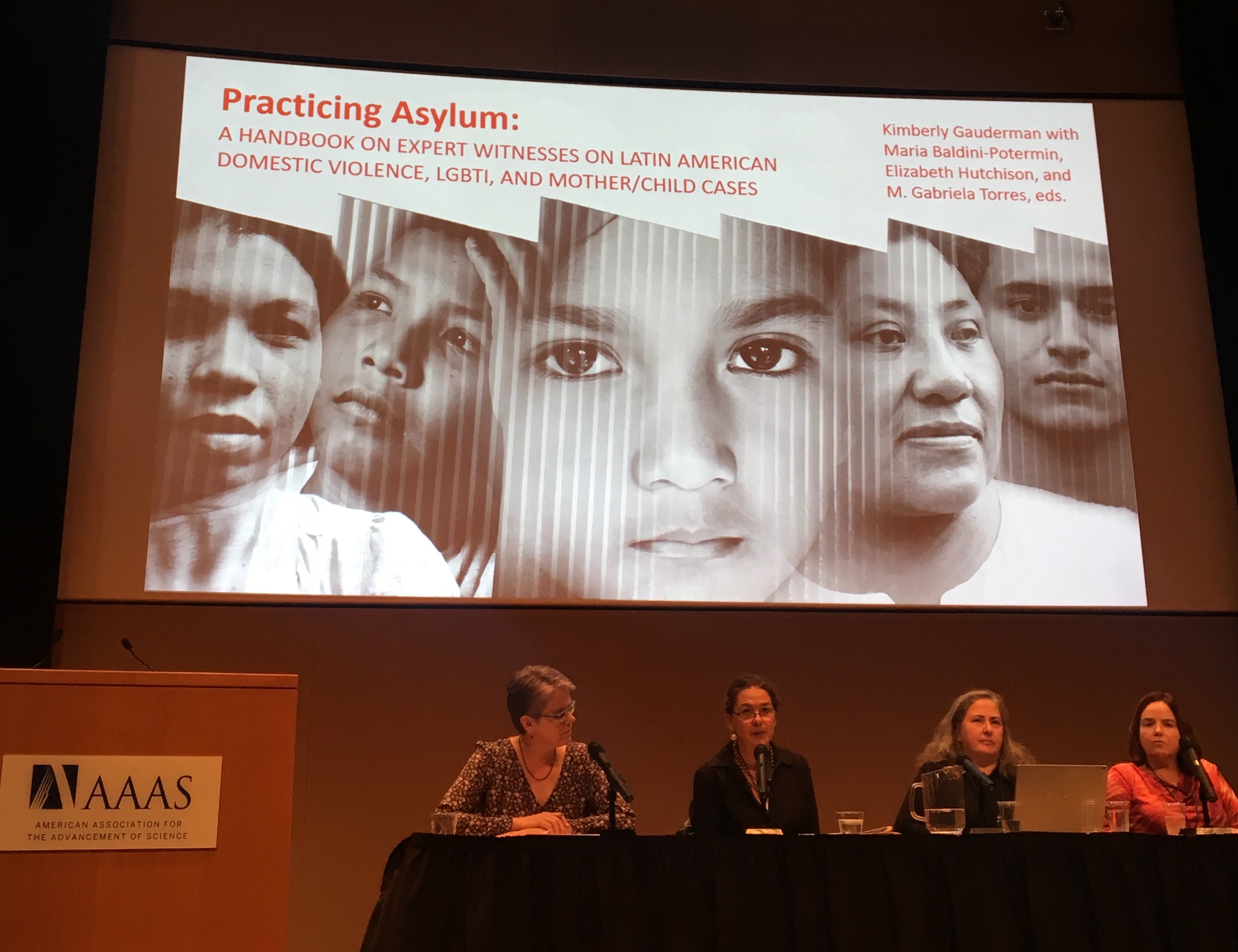Student Reflection: AAAS Science, Technology and Human Rights Conference in Washington, D.C.
March 9, 2020

In Fall 2019, Elisa Cibils, a MALAS/JD dual degree student in her second year of the program, worked as Dr. Kimberly Gauderman’s graduate assistant. Elisa began this project at the same time she started her 1L year at the UNM School of Law. Elisa assisted Dr. Gauderman in her expert witness research for asylum cases and supported her research for her book project, Practicing Asylum: A Handbook on Expert Witnesses on Latin American Domestic Violence, LGBTI, and Mother/Child Cases.
In October 2019, Elisa accompanied Dr. Gauderman and other colleagues to the AAAS Science, Technology and Human Rights Conference in Washington, D.C. Dr. Gauderman and her colleagues’ panel discussion focused on the collaboration between immigration attorneys and expert witnesses in asylum cases. Academic expert witnesses provide important information about the conditions of the country that have led to the persecution of asylum-seekers. Dr. Gauderman’s panel and the other presentations that Elisa attended at the three-day conference gave her a newfound appreciation for the MALAS/JD dual degree. It was inspiring to hear about the collaboration between social scientists, statisticians, biologists, and attorneys from around the world. The presentations highlighted how important it is for human rights advocates to take interdisciplinary approaches to address the current crises facing the environment and vulnerable populations. By sitting in on presentations and workshops with a diverse group of professionals passionate about human rights, Elisa found that there are expansive opportunities for collaboration between the sciences and advocacy work.
Dr. Gauderman’s panel included two other professors, Dr. Hutchison (UNM) and Dr. Torres (American Anthropological Association) and immigration attorney, Maria Baldini Potermin. In listening to their panel and having the privilege of taking notes on their planning meetings, Elisa was inspired by the open and productive conversation between these powerful women, who each came from different professional backgrounds and training. Each of them recognize the gravity of the problems faced by asylum-seekers in the United States under the Trump administration, but they each still retain hope and diligence in their collaborative work. These discussions illustrated not only the importance of collaboration and sharing perspectives, but also how difficult that collaboration actually can be on the ground. Elisa said, “I gained a new appreciation for professionals and academics willing to speak meaningfully with one another and try to translate their field’s jargon and practices with patience and grace. I know that in my career as an attorney, my MALAS background and coursework, including this particular experience in DC, has prepared me for meaningful and valuable collaborations like the ones that I witnessed at this conference.”
Along with Dr. Gauderman’s panel, another presentation by a representative of the nonprofit, Government Accountability Project, “Preventing Harm to Migrant Children in Detention: A Case Study of Collaboration Between Health Whistleblowers, Professional Associations & Public Interest Organizations” also inspired and invigorated the group. In that presentation, everyone present learned that there is a whole field of whistleblower law, a complex combination of international, federal, and state laws strategically applied to protect the rights of whistleblowers. In this presentation, a representative from the Government Accountability Project described the organization’s recent project in collaboration with Department of Homeland Security whistleblowers. The whistleblowers in this case were medical experts who had worked for the U.S. government and were alarmed by the conditions where migrant children were being held. Their project resulted in the publication of the conditions that migrant children were experiencing in extended detention and the negative effects that detention was having on migrant children. In listening to this presentation, the group learned of the complex network of collaboration between lawyers, advocates, media outlets, and medical professionals, all with the shared goal of exposing troubling government practices and advocating for immigrants’ rights. Something clicked for Elisa in hearing this presentation: the hardships that migrants face are multifaceted and exacerbated by multiple powerful actors and agencies. Therefore, the advocacy addressing these problems and injustices must also be multifaceted and collaborative in order to be effective and sustainable.
Elisa also noted, “Attending the AAAS conference and having the opportunity to assist Dr. Gauderman with her book project has reaffirmed my decision to commit to the MALAS/JD program. I hope to work at the intersection of immigration law and workers’ rights after completing my MALAS/JD dual degree. The more I learn about different collaborations between academic and legal fields, the more I understand how essential those partnerships are to effective advocacy.”
